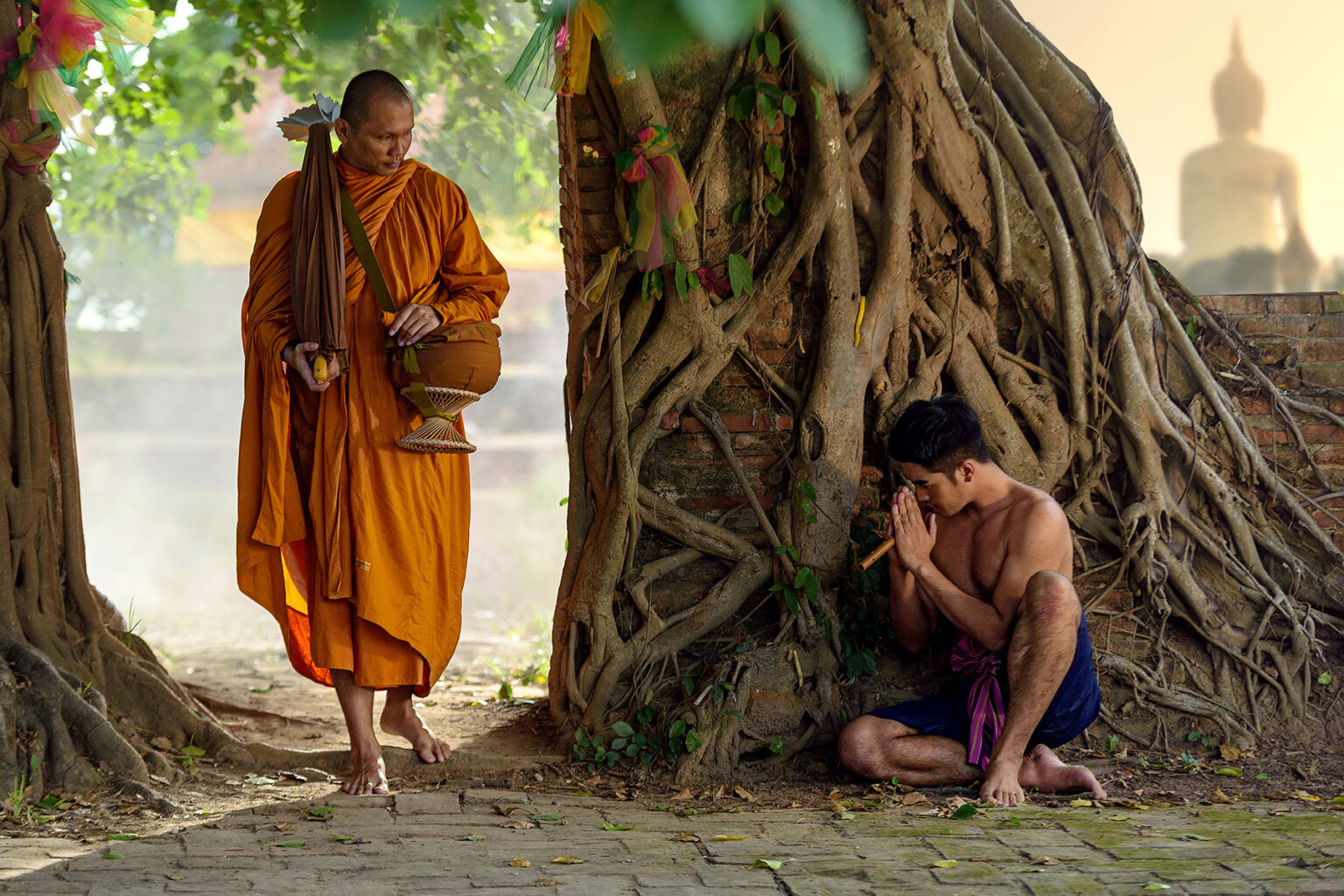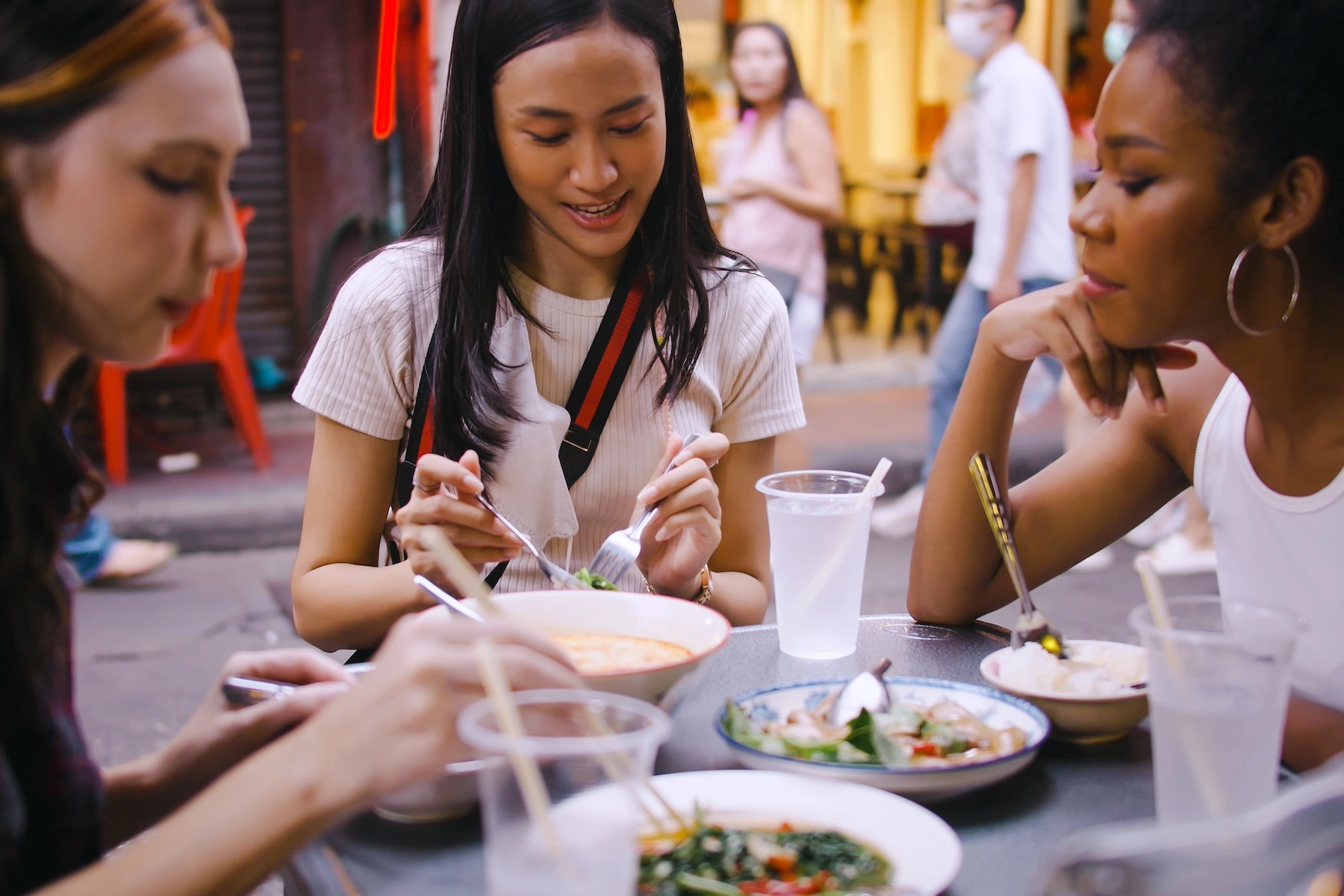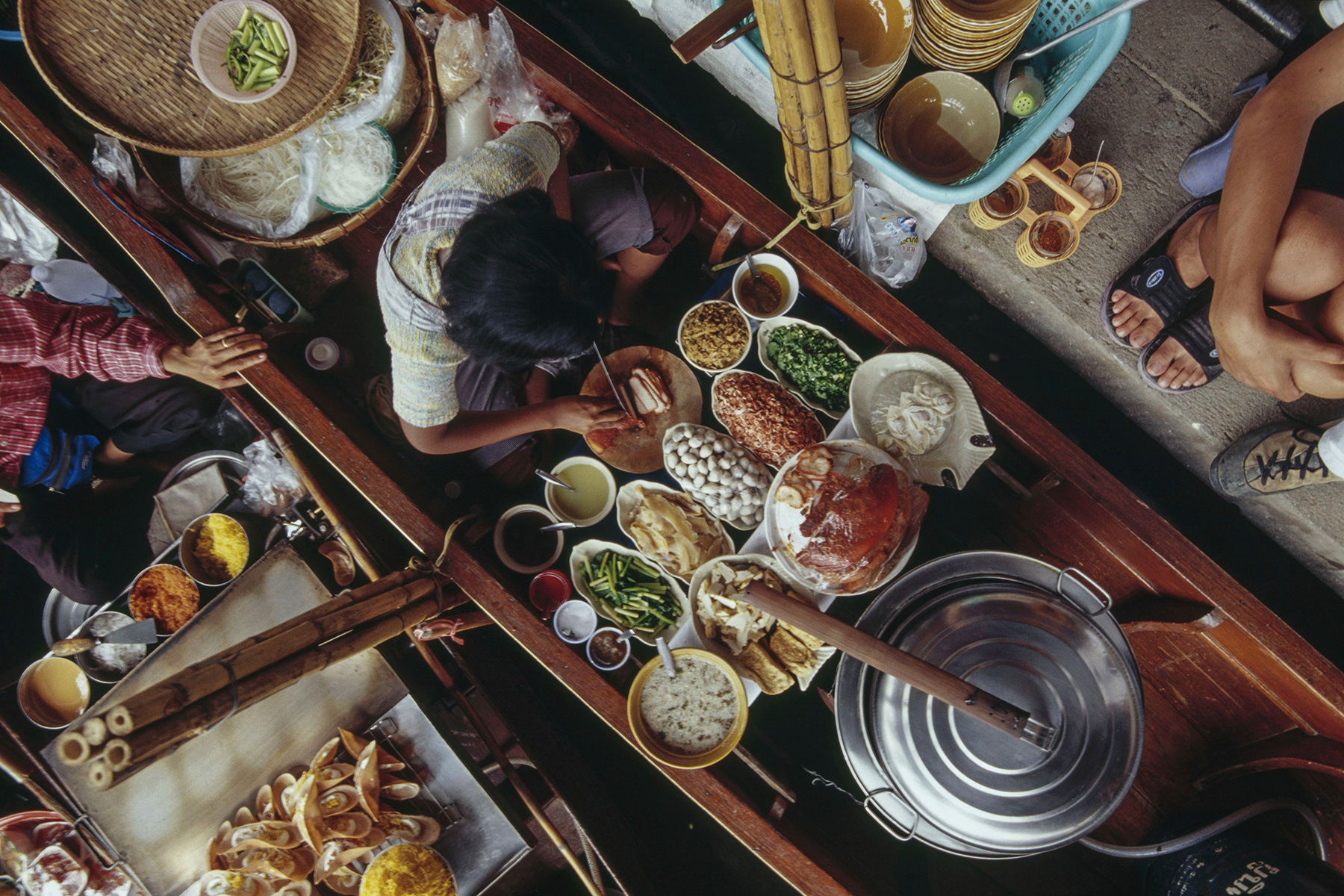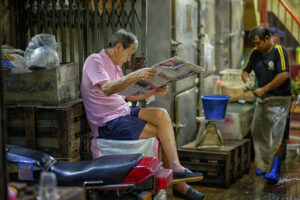Whether you’re chatting with locals, exploring markets, or joining friends for dinner, having a handle on Thai etiquette can help you connect with the people and the traditions that make this country in Southeast Asia so special.
Continue reading to learn more about the following:
- Thailand’s culture and society: an overview
- Societal views on gender roles in Thailand
- How to greet someone in Thailand
- Conversational etiquette in Thailand
- Typical clothing and specific dress codes
- What are the table manners in Thailand?
- Dating and relationships in Thailand
- Thai celebrations and occasions
- Work and business culture in Thailand
- Customer and public services in Thailand
- Useful resources
Thailand’s culture and society: an overview
Thailand (ประเทศไทย) has a distinct culture that goes back centuries. The country has the questionable honor of never being colonized, and it became a constitutional monarchy in 1932. Since then, major Thai cities, such as Bangkok (กรุงเทพฯ), Chiang Mai(เชียงใหม่), and Phuket (กรุงเทพฯ เชียงใหม่ และภูเก็ต) have all become favorites with global travelers and expats.
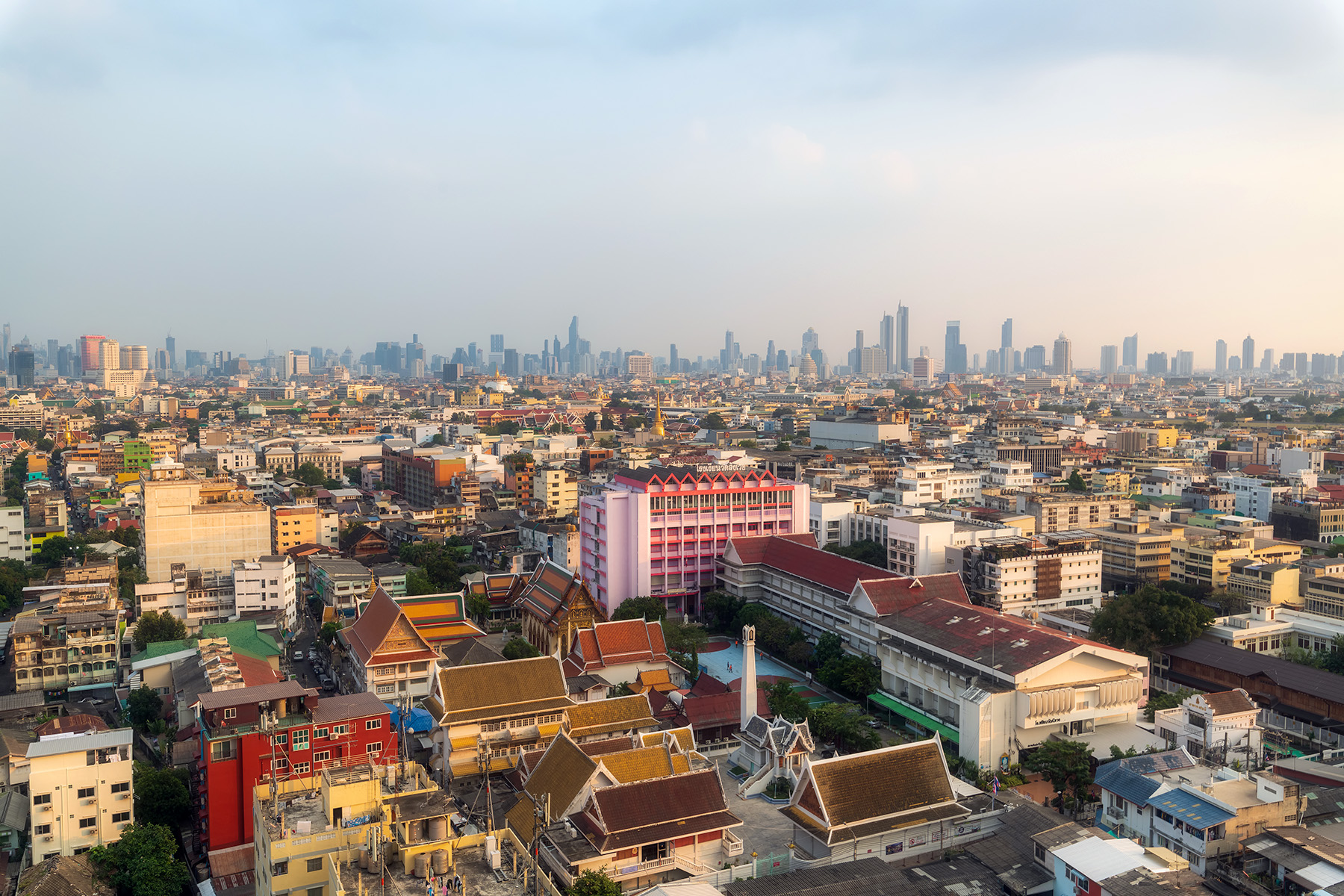
The main religion in Thailand is Theravāda Buddhism, with 92.5% of the population practicing this belief system. There are also 5.4% Muslims, 1.2% Christians, plus several other religions practiced by smaller numbers (Department of Religious Affairs, 2021).
While the official language in Thailand is globally known as Thai (ภาษาไทย, phasa Thai), the country is home to 73 living languages, 51 of which are indigenous. There are also numerous regional dialects. According to a 2021 survey, 92.7% of the population has Thai as their first language. Other spoken languages include:
- Burmese (2.4%)
- Chinese (8.5%)
- English (44.6%)
- Malay (1.9%)
That said, English is not commonly heard outside the larger cities, and Thailand ranks 97th out of 113 on the 2022 English Language Proficiency Index.
Are there distinct regional variations?
Thailand has different regions with distinct cultural norms and variations on what foreigners see as the collective culture. Regional differences are most strongly evident in cuisine and climate.
Central Thailand, which includes the capital city Bangkok, is historically the country’s economic and cultural hub. The more rural and chilly north and northeast regions are home to distinct ethnic groups, such as the Lao Isan and Yuan groups, who are heavily influenced by Lao and Khmer cultures. These are the poorer regions of Thailand.
The southern region has a sizable Muslim population, including around three million Malay Muslims. These groups are culturally – and, in the case of Malay Muslims, also linguistically – distinct from the majority Buddhist population.
Thai identity and social structure
The Thai don’t exist as a homogenous group. For example, there are some 70 ethnic communities, including Central Thai, Thai Lao, Khon Muang, and Pak Tai. According to the International Work Group for Indigenous Affairs (IWGIA), an estimated five million Indigenous people live in Thailand, accounting for 7.2% of the total population (2023).
Distinctions run across age lines and social standing, and there is also a bit of a regional north-south divide. Certain migrant and indigenous groups in Thailand have been historically marginalized, including Malay Muslims in the south and the indigenous Karen tribes.
Broadly speaking, the country knows three social classes:
- A small nobility that includes the royal family
- A larger middle class that includes government, military, and business elites at the top
- A working and lower class consisting largely of manual workers in both urban and rural areas
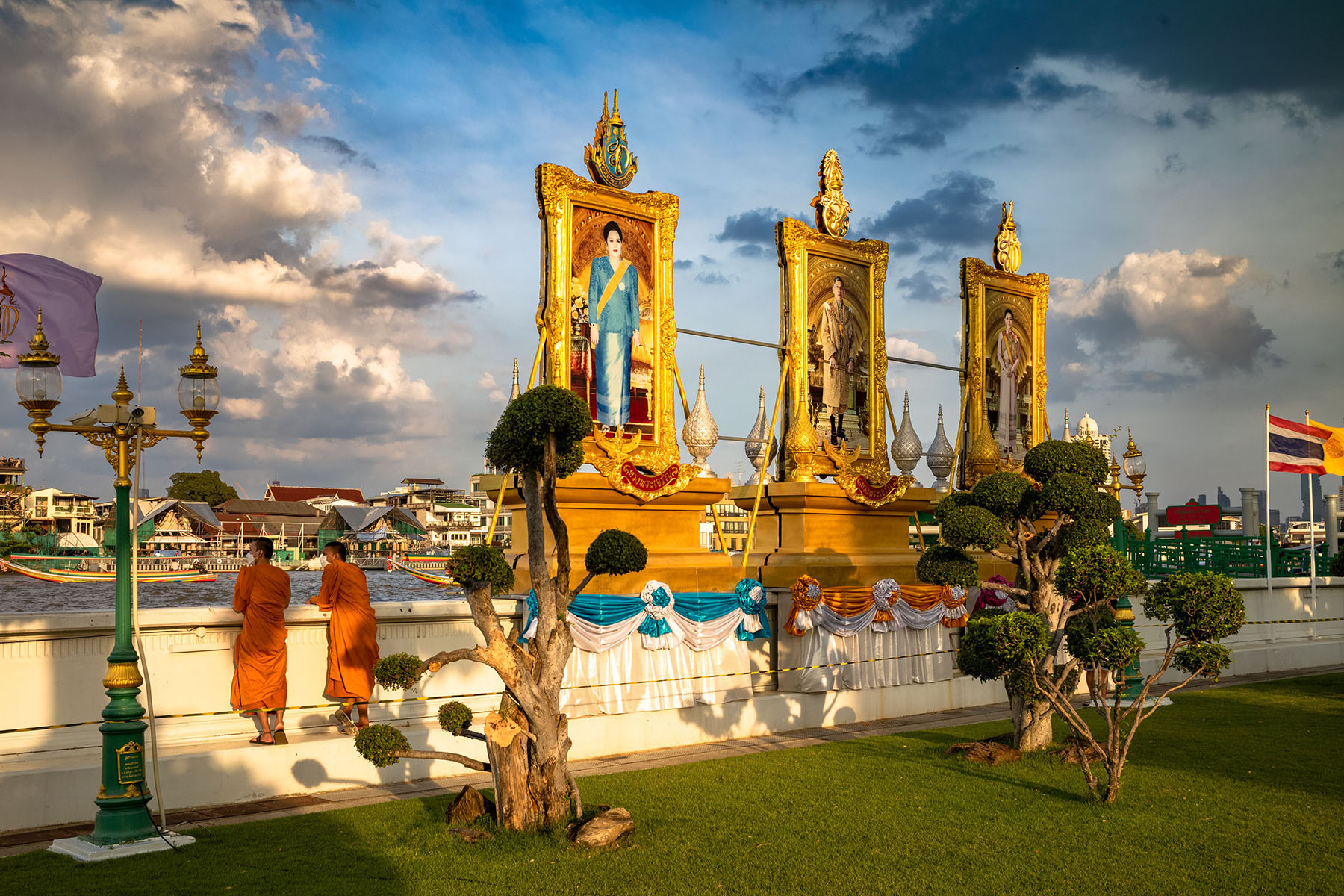
Despite all that, people have a strong sense of national identity. According to a 2018 World Values Survey, around 97% of citizens feel either quite or very proud of being Thai.
Societal views on gender roles in Thailand
Thailand is still a fairly traditional country when it comes to gender roles. Patriarchal and conservative attitudes are commonplace, with women dealing with nearly three times more unpaid domestic and care chores than men.
According to a 2023 IPSOS study, 39% of respondents believe men who stay home to look after their children are less masculine. However, interestingly, 55% of interviewees identified as feminists, which is above the global average of 41%.
Regarding legal rights (สิทธิทางกฎหมาย), women are generally equal to men, thanks to the 2015 Gender Equality Act (prohibiting gender-based discrimination) and the 2017 Constitution. Thai women also got full abortion rights in 2020.
Despite the legal protections, women are sometimes treated as second-class citizens. For example, domestic violence (ความรุนแรงในครอบครัว) is still a large issue in Thailand. The country also ranks 79th out of 146 on the 2022 Global Gender Gap Report. While Thailand scores high on women’s education and health, it lags behind in economic participation, opportunity, and political empowerment.
Generally, expat women can expect to receive the same treatment as Thai women.
How to greet someone in Thailand
Greeting someone with physical contact is very rare in Thailand, so hugging someone to greet them is not done. Instead, you can use the traditional gesture called the wai (ไหว้). This involves placing your hands together (palm on palm, fingers on fingers) and bowing slightly.
The gesture is also used to thank someone, apologize, or say goodbye. Many Thais also wai when they pass temples, shrines, spirit houses, or anything related to the monarchy (e.g., a picture of the king).
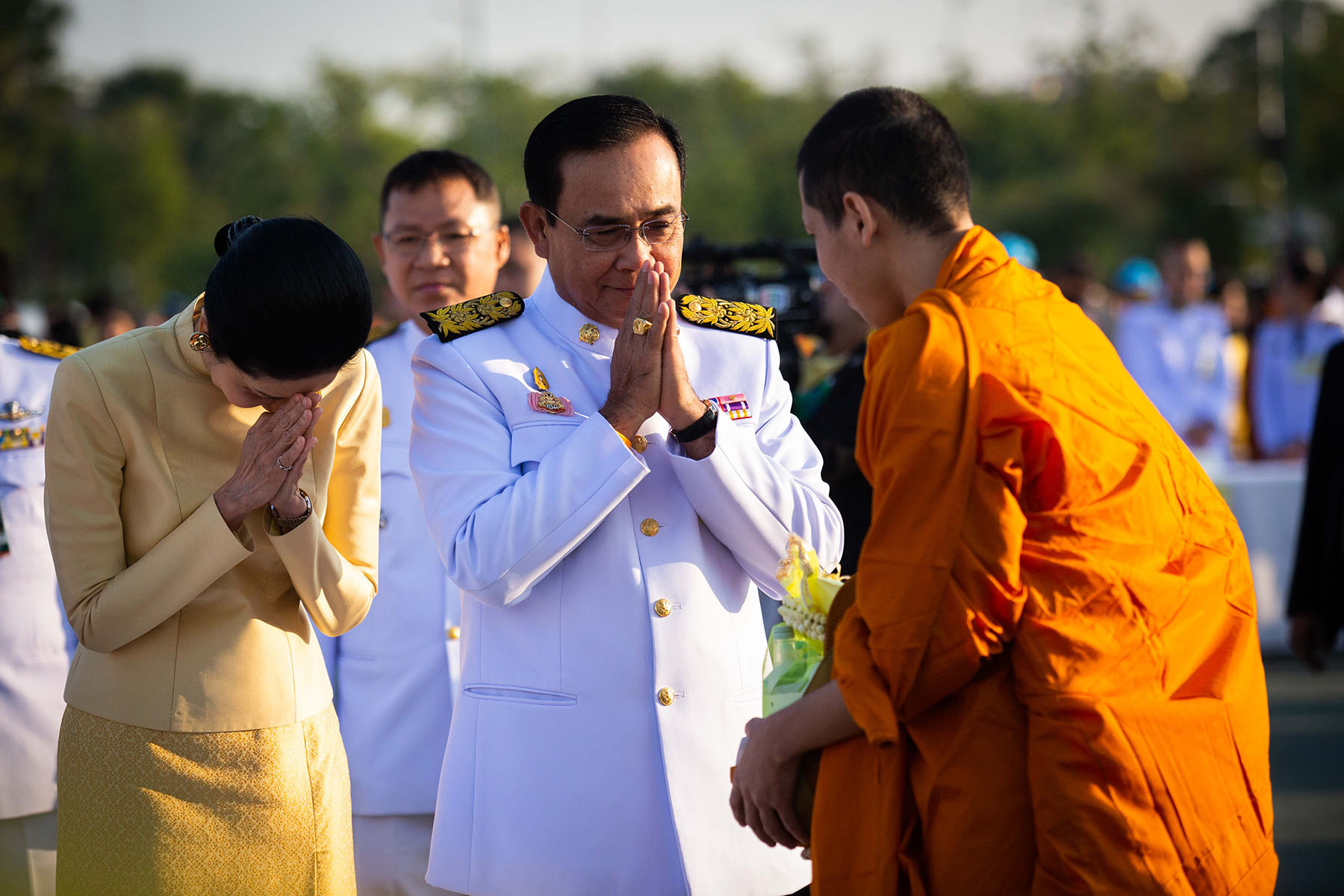
Locals don’t expect foreigners to be wai experts. While it’s no huge faux pas if you don’t get it perfectly right, making an effort goes a long way. The basics include:
- The position of the hands varies according to the importance or seniority of the other person; keep them at chest level for a standard wai, but raise them in front of your face if greeting someone of importance or much more senior than you.
- Usually, the person who is the youngest or of lower social status initiates the wai. The recipient will then reciprocate unless they have a very high social status (e.g., a royal or a monk).
- As an expat, you should always return a wai out of politeness. That said, it’s not expected of you in the case of children, servers, or shop assistants. Instead, you can give them a nod and smile.
- If you happen to be holding something when someone offers you a wai, give them a light bow in return
While handshakes are uncommon in Thailand, some Thais do use them when greeting people from the Global North (GN) or in international business situations. A Thai man will only shake a woman’s hand if she extends it first.
What titles to use when greeting someone?
It’s customary in Thailand to say khun (คุณ) before a person’s first name. This word is the equivalent of Mr/Mrs/Ms/Mx and applies to men, women, and non-binary or third-gender persons. If you’re with close friends of similar age, you can typically drop the honorific.
In formal situations, you can follow khun with the surname rather than the first name. If the person has a title, you must use that instead. For example, primary school teachers should be addressed with kru (ครู). Ajahn/ajarn (อาจารย์) can be used for more senior teachers and lecturers. Lawyers, judges, and sometimes monks can be addressed tan (ท่าน).

Local expert
Jane Evans
Insider tip
Knowing which pronoun or title to use in Thailand can be tricky, especially when you are not sure whether someone’s older or younger than you. In this case, using a name instead of a pronoun can be helpful and save you from a social faux pas.
Many Thais, especially shopkeepers or those in the service industry, err on the side of caution, which means that people can get offended by being referred to with a pronoun meant for someone older, for example, being called ‘uncle’ by someone not young enough to be a nephew.
The Thai equivalent for ‘hi’ or ‘hello’ is sà-wàt-dii (pronounced sawatdee). When greeting someone, you can say sà-wàt-dii kah to a woman and sà-wàt-dii krup to a man.
Thai nationals often use their name as a pronoun, so don’t be alarmed if someone refers to you or themselves by the first name.
Thai attitude toward visiting and punctuality
People in Thailand are typically very welcoming of others into their homes, so you are unlikely to offend anyone by visiting them without warning. However, you might want to call ahead in case they are out or have plans.
The Thai attitude towards punctuality is pretty relaxed, and arriving a few minutes late for meetings is perfectly acceptable. That said, don’t stretch this too far, and always keep on time for important formal events, such as business meetings or job interviews.
When visiting someone’s home, you must take off your shoes at the door. In addition, it’s considered bad luck to step on the threshold when walking through someone’s doorway; remember to step over it when you pay a visit.
Conversational etiquette in Thailand
Most people in Thailand are friendly and enjoy chatting with people from other countries. Good conversation topics include food, sports, traveling, arts and culture, or Thai culture and history (if you’ve done your research). Some locals will also appreciate you’re learning the Thai language and trying out a few simple sentences.

As in many countries, conversation topics to avoid include politics, religion, and anything that is likely to cause an argument. You should also refrain from questioning or insulting the monarchy at all costs. Thailand has strict defamation and lèse majesté laws, meaning that defaming royalty can land you a fine and even imprisonment.
The Thai communication style is generally quite reserved. You should speak softly during conversation and not too loud or brash, as this can be misinterpreted as rudeness or aggression. Thailand’s etiquette also involves being polite and not too direct. For example, a Thai person will usually find an indirect way of refusing an invitation rather than saying no to your face.
Conversation tends to be accompanied by a lot of smiling and nodding. However, this is people’s way of being friendly and polite, so you shouldn’t assume they fully agree with you or accept any invitation.
Cues on body language in Thailand
Unlike other parts of the world (e.g., southern Europe and the Middle East), people in Thailand don’t talk with their hands. Although gesticulating isn’t a big faux pas, people will find it intimidating or think you’re angry (especially when you are too animated). Instead, people often cross their hands behind their backs or hold their palms together in front of their bodies.
When conversing with someone, it’s good manners to smile, occasionally nod to show you’re paying attention, and use eye contact sparingly. Physical contact – such as touching someone’s arm or patting their back – typically only happens among close friends, not between members of the opposite sex. Personal space is generally about an arm’s length or one meter.
Cultural faux-pas: what not to do
Some gestures are considered rude or offensive in Thailand and should be avoided at all times. These include:
- Touching or passing something over someone’s head. This is the most sacred part of the body in Thai culture, so avoid even playfully ruffling a child’s hair.
- Pointing with your feet, raising your feet, or showing the soles of your feet – in contrast with the head, feet are seen as the dirtiest/lowest part of the body, so use them for walking and standing on only.
- Pointing your finger at another person. If you want someone’s attention, look at them and raise your chin, or hold your arm out and waggle your fingers downwards instead.
- Using your left hand to pass anything to someone, as this is another body part deemed unclean
- Standing with your hands in your pockets while talking to someone
- Turning your back on any statue of Buddha
- Stepping over books or people sitting on the floor; books are respected as teachers. The act of putting feet over them or other people is disrespectful.
- Treading on coins (putting the foot on anything with a royal image is not done)
While these gestures are regarded as disrespectful, Thais are generally very forgiving and won’t expect expats to remember everything. They will also not interpret the odd indiscretion as intentional rudeness.
What is the humor in Thailand like?
The humor of Thailand is varied and tends to reflect the generally upbeat nature of the people. Conversations are often peppered with light-hearted jokes or comments. People like to make fun of unfortunate or negative events, drawing humor out of the situation. Sometimes, this may stretch the boundaries of good taste, but people rarely say something intending to offend.

Popular forms of comedy in Thailand include slapstick, silly humor, clever wordplay, and observational humor. Famous Thai comedians include:
- Kom Chuanchuen
- Lortok
- Mum Jokmok
- Sudarat Butrprom
- Udom Taephanit
Typical clothing and specific dress codes
There is no specific dress code in Thailand, and you’ll find a mix of traditional and GN-style clothing.
For casual wear, it’s advisable to keep things reasonably conservative, modest, neat, and clean. Light clothing such as shirts, T-shirts, dresses, and trousers are suitable in the warmer months. Avoid anything too revealing and save beach-wear for the beach. Easy and convenient footwear, for example, sandals, is useful as you may occasionally need to take shoes off before entering buildings.
Business clothing is relatively globalized. Men wear suits, shirts, and smart shoes. Women wear business suits, blouses with skirts or trousers, conservative dresses, and ballerinas or heels.
When visiting religious temples, you are expected to cover areas of the body such as the shoulders, knees, and chest. You will also need to remove your shoes. Women often wrap themselves in a light shawl before entering. Many Thai nationals will wear traditional clothing for temple visits and formal occasions such as weddings or funerals.

Local expert
Jane Evans
Insider tip
When you visit a government office, do not wear shorts or have uncovered shoulders. This includes immigration offices, tax offices, and driving licensing offices.
What are the table manners in Thailand?
As with most countries, Thailand has specific dining etiquette you should follow when meeting someone for a meal. It starts with you removing your shoes before eating; this is customary in Thai homes and some restaurants. The host will normally show you where to sit. If you are sat on a mat or the floor, you must make sure you don’t show the soles of your feet to anyone, as this is considered offensive.
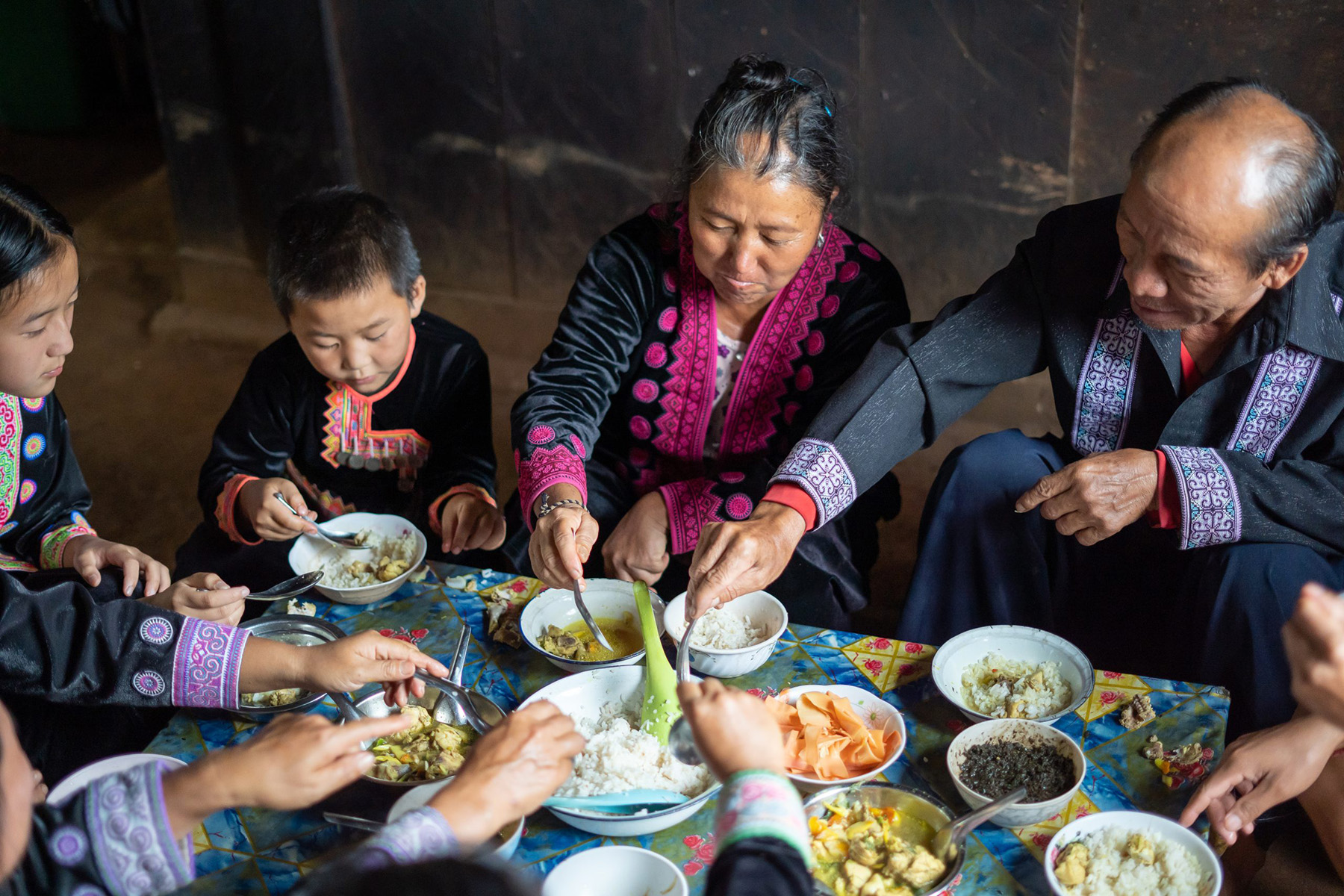
Sharing meals communally is the norm, so ordering your own dish is deemed not only impolite but also selfish. Usually, the most senior ladies will choose dishes for the entire table. It’s polite to wait for the host to start eating before tucking in.
Contrary to what you might expect from a Southeast Asian country, Thai people eat using a fork and a spoon. Typically, only noodle dishes involve using chopsticks. It’s customary to use the fork in your left hand and scoop food into the spoon in your right hand, which you use to eat.
If you are using your hands to eat (e.g., when eating sticky rice), make sure to use the right hand, as the left is considered unclean. Also, only use your right hand if you pass dishes to anyone.
When filling your plate, don’t pile up as if you’re at an all-you-can-eat buffet with only 10 minutes left. Instead, serve yourself with small portions. You can always go back for more.
Unlike many other countries, you are not obliged to finish your plate. While you should try to not waste food, it is okay if you do leave a few mouthfuls as this signals enough food was served. Place your utensils on the plate to show that you have finished.
Important things to keep in mind when socializing
The host will typically initiate the first toast. Guests can then offer additional toasts. You can raise a toast in Thailand by saying chok dee (โชคดี).
If you want to summon a server in a restaurant, wave discreetly with your palm down or say nong (น้อง). Never click your fingers, not in Thailand or elsewhere.
As eating is such a social activity in Thailand, a lot of socializing revolves around mealtimes – meeting in restaurants or cafes or attending a gathering in someone’s home. People also enjoy going to bars, cinemas, museums, parks, and sports venues to watch or play sports.
According to World Bank statistics (2019), Thailand has relatively high alcohol consumption rates. Thai people drink around 7.8 liters of pure alcohol per year, compared to the global (5.4) and regional (3.8) averages. It is, however, much lower than the average in the European Union (11) and the US (9.6).
Dating and relationships in Thailand
The dating culture in Thailand varies across different regions of the country. While in the major cities, things are quite globalized and liberal, you’ll find a more traditional and conservative approach in rural areas.
That said, dating norms in the country are pretty standard. Couples tend to take their time before getting serious, meeting in places such as restaurants, bars, and cinemas.

Once things pick up pace, you can expect to meet your partner’s family members. Family plays a central role in Thailand, with many households consisting of extended family units spanning three generations. Lovestruck Thais usually want their parents’ or family members’ approval before making their relationship official.
Marriage is still popular in Thailand. In fact, it is one of the countries where marriage rates have increased in recent decades. Although the country is known for its LGBT+ dating scene, gay marriage is currently illegal in Thailand.
Thai celebrations and occasions
There are many celebratory occasions in Thailand, from personal celebrations (such as birthdays and weddings) to local and national festivals.
The Thai calendar has 19 public holidays to honor religious events and noteworthy historical dates. The country also has three New Year celebrations:
- The Solar New Year on 1 January
- The Lunar New Year (usually between late January and early February in the Gregorian calendar)
- The Thai New Year (Songkran) on 9 April
Other key dates on the Thai calendar include:
- Coronation Day (วันฉัตรมงคล, Wan Chattramongkhon) – celebrating the coronation of King Vajiralongkorn
- King Vajiralongkorn’s Birthday (วันคล้ายวันเกิดพระบาทสมเด็จพระวชิรเกล้าเจ้าอยู่หัว)
- Chulalongkorn Day (วันปิยมหาราช) on 23 October – commemorating the passing of King Chulalongkorn the Great
- Constitution Day (วันรัฐธรรมนูญ) on 10 December – commemorating the establishment of the first national constitution in 1932
As in many other countries, people in Thailand use celebratory occasions to gather family and friends and enjoy a festive meal. If the celebration is a personal one, it usually involves an exchange of gifts and sometimes cards. For more local or national occasions, this may include visiting a temple, street parades, and fireworks displays.
What are birthdays like in Thailand?
While GN-style birthday celebrations have recently become more of a thing, birthday parties with gifts or a cake are usually only reserved for kids. Traditional birthday celebrations are much more low-key and self-effacing. They tend to involve a trip to a local temple and maybe a donation to the temple or a monk.
In terms of having a fun celebration, the onus is on the birthday person to organize (and pay for) drinks and/or a meal for family and friends.
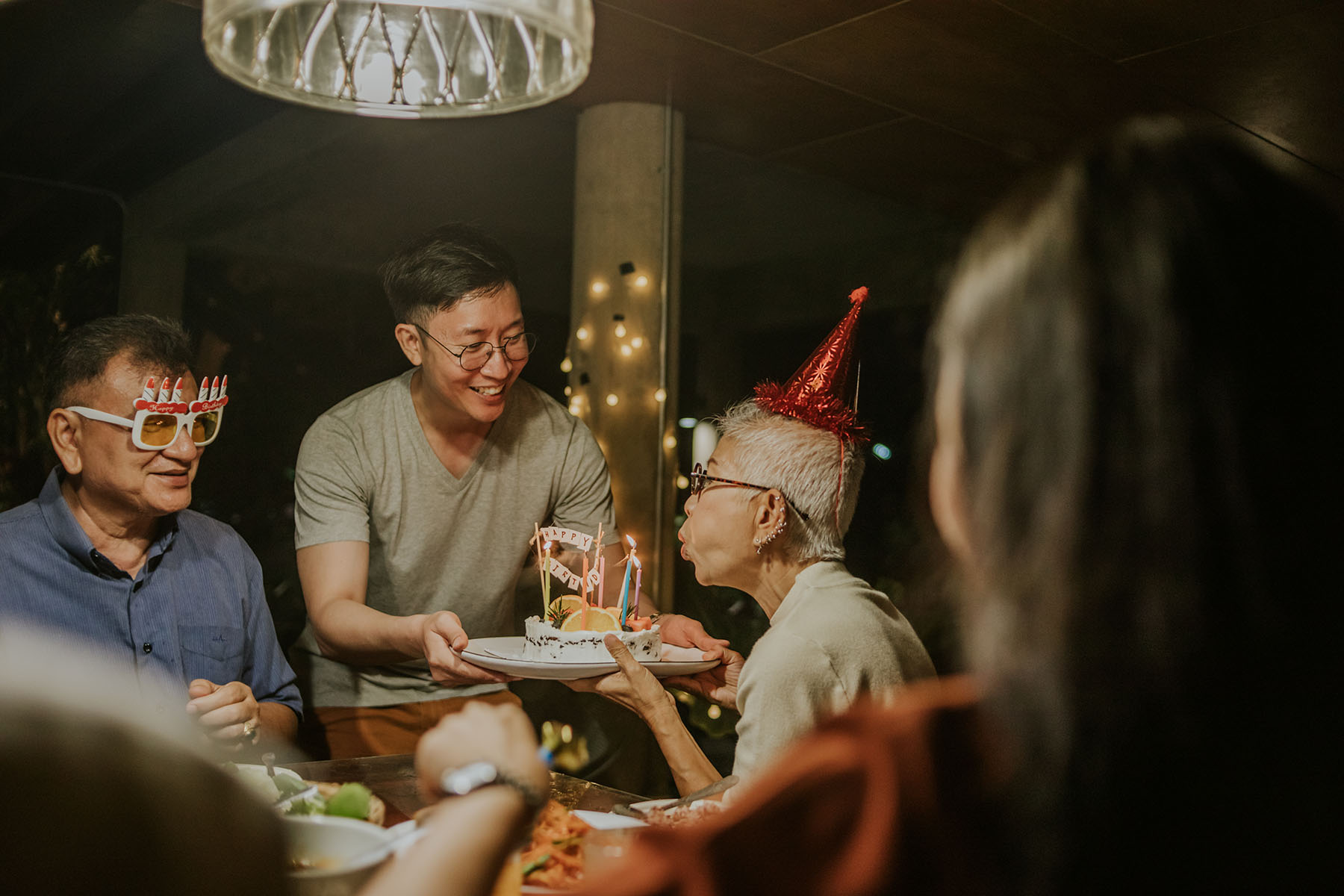
If you want to wish someone a happy birthday in Thai, you can say suk san wan gert (สุขสันต์วันเกิด). Many Thai nationals wish each other happy birthday in English and will sing the familiar Happy Birthday song (i.e., in a slow tempo and with only the lyrics ‘Happy Birthday’ throughout).
What gifts should I bring in Thailand?
Thailand’s etiquette around gift-giving is quite laid-back. People generally only expect gifts at weddings. However, in most situations, it’s perfectly acceptable to make an effort and buy a present. Suitable gifts include flowers, chocolates, sweets, books, trinkets, and fruit. Traditionally, people give money at weddings.
It’s more important to make an effort when it comes to wrapping. A beautifully wrapped present will always go down well. However, avoid black, blue, or green wrapping paper, as these have negative or unlucky connotations.
In Thailand, it’s not customary to open a gift in front of the giver. Also, remember the ‘dirty lefty’ rule that applies to almost all Thai interactions. When giving or receiving a gift, use the right hand.
Work and business culture in Thailand
Business culture in Thailand is formal and hierarchical. Senior staff are usually the sole decision-makers and command authority at business meetings. That said, work environments tend to be quite relaxed. There is a belief in having fun while working and not getting too stressed.
Thai work culture is built on traditional Asian values and places importance on family values, respect for seniority, and commitment to achieving professional success. Although Thailand ranks 21st out of 190 for ease of doing business in the 2020 World Bank’s Doing Business report, the culture is not as tightly competitive as in some other countries.
Formal meetings usually start with friendly chit-chat, and business meals are common. Thai businesses like to form close relationships with one another, built up slowly over time. Initial meetings are usually just to establish a rapport. As with general day-to-day conversation, direct refusals are typically avoided in business discussions.

Local expert
Gayatri Bhaumik
Insider tip
Be sure to make an effort to get to know people. Although businesses operate on traditional hierarchies, they typically run on relationships and personal rapport. Small talk and low-stakes gifts are de rigueur.
In contrast with less formal situations, punctuality is essential in Thai working life. You should absolutely avoid turning up late for meetings or job interviews.

Official work hours are usually from 09:00 to 18:00 – with one hour for lunch – on Mondays through Fridays. However, Thai work culture is renowned for long working hours, demanding schedules, and a minimum amount of vacation days.
In offices, you can expect a slightly conservative, formal dress code to match the traditional hierarchical structures. Loyalty, long-term commitment, and a demonstration of cultural sensitivities are highly regarded. Most professionals in Thailand carry business cards. When exchanging cards, you should – you guessed it – use your right hand.
Customer and public services in Thailand
Both businesses and customers value good service. According to 2020 data, customer satisfaction is Thailand’s most important customer service performance indicator, and 97% of companies track it. As such, the customer service level in the country is generally high.
Most larger firms will have a customer service or complaints manager or team you can contact if you are not satisfied with their level of service. Many companies also have digitized sales and after-sales care processes so customers can deal with most things online.
When it comes to etiquette while standing in line in Thailand, you can expect to see disorganized crowds rather than lines. However, people are so polite you’ll rarely get an issue with others cutting in front.
If you prefer to avoid standing in line, some businesses (e.g., restaurants or busy downtown stores) use professional queue fixers. Also known as wait-in-line aunties, these mostly senior-age women will stand in line for you in return for a small fee (typically around THB 700).
Is it ok to tip in Thailand?
Tipping is not mandatory in Thailand. However, leaving a tip is much appreciated if you have received good service. When you do tip, around 10% of the bill is standard in restaurants and a nominal amount with other services. Places where you might want to leave a tip include:
- Bars, cafes, and karaoke
- Hotels
- Taxi or tuk-tuk drivers
- Tour guides
Some businesses have already added a service charge to their price, so you might want to check the bill before you double-tip. Other venues, such as street food stalls, do not expect to get tipped and will get confused and even slightly offended.
One important thing to remember about tipping in Thailand is that bank bills and coins bear the image of the king. Never throw money down as a tip, and don’t ever stand on money in Thailand; this is a criminal offense.
Useful resources
- Tourism Authority of Thailand – English-language website of Thailand’s official tourism board
- Culture Trip Thailand – website with useful information, including how to wai in Thailand
